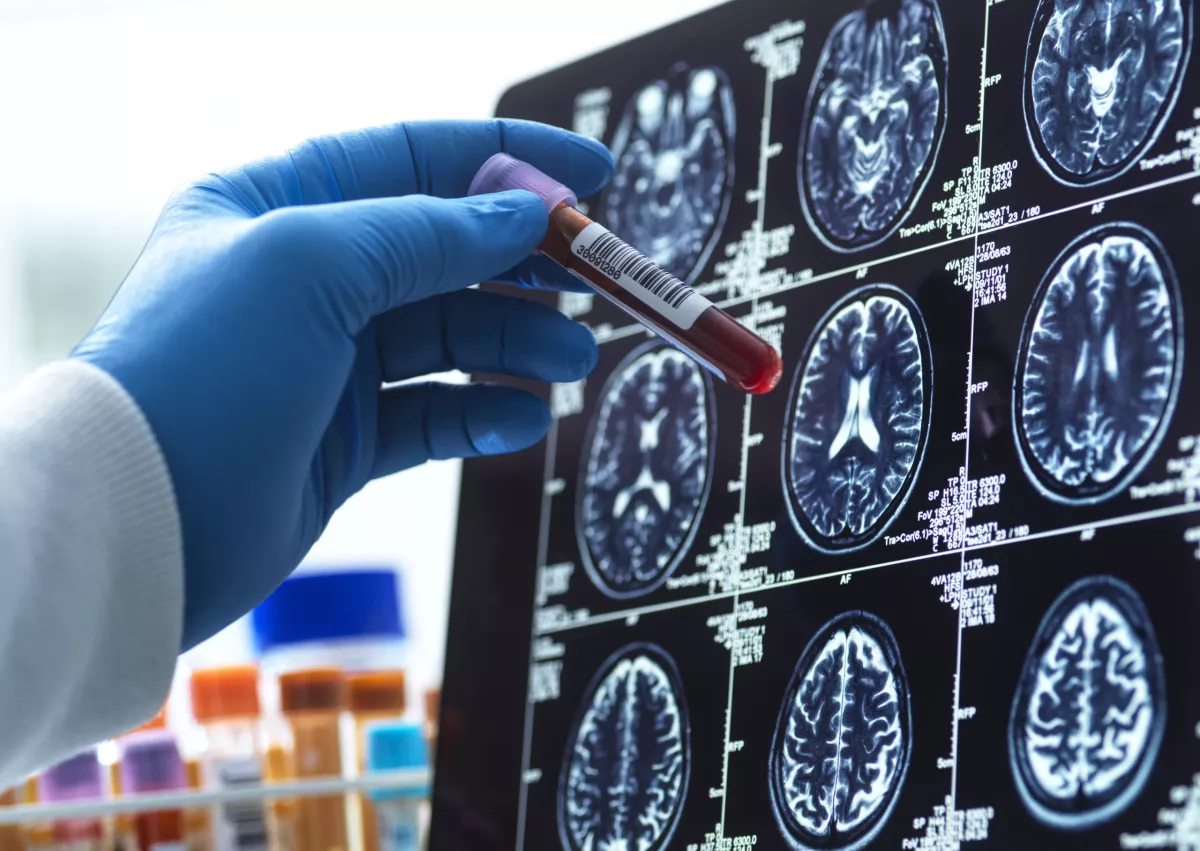A group of health conditions that cause swelling (inflammation) in the brain is called autoimmune encephalitis (AE). In such cases, this condition occurs due to the immune system, which mistakenly attacks healthy cells in the brain. The symptoms of this condition are usually different among people and may include memory loss, changes in thinking or behavior, and seizures.
This type of encephalitis is different from encephalitis caused by a viral or bacterial infection (also called infectious encephalitis). The difference is that infectious encephalitis is not caused by an immune system reaction and is treated with different medications.
Healthcare professionals do not fully understand what exactly causes the immune system reaction that leads to autoimmune encephalitis. However, they think certain medicines, cancers, or infections trigger this type of encephalitis. Those who suffer from another autoimmune disease or have a family history of autoimmune conditions are more prone to develop AE.
People who do not get treatment for this condition may experience serious and even life-threatening complications. Fortunately, there are some treatments that can lead to recovery. Furthermore, many people with AE make a full recovery, but some of them may experience lasting symptoms.
Symptoms
Generally, people with AE experience different symptoms. Most of them have headaches and fever, and may experience any of the following symptoms. Examples include:
- Memory loss
- Psychiatric symptoms include anxiety, panic attacks, behavioral changes, agitation, hallucinations, delusions, difficulty organizing thoughts, and others
- Trouble with language
- Seizures
- Consciousness changes
- Sleeping disturbances (insomnia)
- Involuntary movements
In some cases, autoimmune encephalitis causes severe seizures that need emergency care. This type of seizure is called status epilepticus, and it may last more than 5 minutes or occur more than once while a person is not conscious.
Commonly, the AE symptoms worsen over time. In such cases, the course of the disease is called progressive. When the symptoms change from mild to severe, the course is called relapsing-remitting. In addition, people with multiple sclerosis may also experience the same course of the disease.
If you or a loved one experiences any of the previous symptoms or others that cause concerns, go to the nearest emergency room or call 911 in the U.S. Without treatment, this condition can be fatal.
Causes
Nowadays, healthcare professionals do not know what exactly causes autoimmune encephalitis. When it occurs, the immune system mistakenly attacks healthy cells of the brain. In normal circumstances, antibodies produced by the immune system help protect the body from multiple viruses, bacteria, and other germs that cause illnesses. In people with autoimmune encephalitis, these antibodies target and attack some receptors in the brain. As a result, it leads to brain inflammation (also known as swelling) and other symptoms. Check below for other possible causes of AE:
- Some types of cancer (in such cases, the condition is called paraneoplastic AE)
- Infections (including from the herpes simplex virus)
- Certain medications (such as monoclonal antibodies and immunosuppressants used to prevent rejection after an organ transplant)
People with a strong family history of autoimmune diseases are at higher risk of developing AE.
Autoimmune Encephalitis Types
In general, there are several types of this condition. Each of them is caused by a reaction of the immune system that attacks certain receptors in the brain. Check below some types of AE:
- Anti-NMDA-receptor autoimmune encephalitis – In people with this type of AE, the immune system attacks the NMDA receptor in the brain. Mostly, this type of disease is the most common type of AE, and it is often diagnosed in young women and children. Psychosis, facial movements, and seizures are the most common adverse reactions of anti-NMDA-receptor autoimmune encephalitis.
- Anti-GABA-B receptor encephalitis – In such cases, the condition is related to a tumor (in most cases, small-cell lung cancer). It often causes seizures, confusion, and memory loss. While it may affect young people, it is mostly diagnosed in people over 60 years old.
- Anti-GABA-A receptor encephalitis – The average age of diagnosis of this type is 40, but it may occur in children. The most common negative effects of this type of AE include movement disorders, behavioral and thinking changes, and seizures.
- Anti-AMPA receptor encephalitis – This type of disease usually affects females and may cause confusion and memory loss. Most diagnosed cases are around 62 years old.
- Anti-LGI1 limbic encephalitis – It mostly occurs in males and causes seizures, confusion, and memory loss. Most people develop it over 60 years old.
- Anti-CASPR2-associated encephalitis – Those who develop this type of AE usually experience confusion, memory loss, insomnia (sleep disturbances), nerve pain, and others. It also may cause a rare syndrome known as Morvan syndrome (a condition that causes blood pressure changes, painful cramps, memory loss, and other symptoms).
- Anti-lgLON5 disease – Usually, people with this type of autoimmune encephalitis experience sleep symptoms, including movements during sleep. Mostly, this type of AE happens over 60 years old.
Risk Factors
Healthcare professionals have identified some factors that could elevate your risk of developing autoimmune encephalitis. Examples include:
- Medical history of autoimmune encephalitis or other autoimmune diseases
- Herpes simplex virus encephalitis in the past
- Administer monoclonal antibodies or immunosuppressants
- Tumors (especially small-cell lung cancer)
According to some research, there are certain genes that may also play a role in autoimmune encephalitis.
What Happens if Autoimmune Encephalitis is Left Untreated?
While people with a mild form of AE do not experience any complications, in more severe cases, they can experience the following ones. Check below some examples:
- Severe seizures (also called status epilepticus) – This complication requires immediate treatment. Otherwise, it may lead to a serious condition called autoimmune epilepsy.
- Respiratory failure (inability to get enough air) – It is also an emergency that needs a machine that helps to breathe. This procedure is called mechanical ventilation.
- Problems with heart rhythm and blood pressure – People with autoimmune encephalitis may experience problems with autonomic functions (including digestion, urination, heart rhythm, and blood pressure).
- Fever – Frequently, people with AE have high fevers.
Furthermore, some people may develop another complication in which the condition returns. Usually, AE recurs in people who have had anti-LGI1 limbic encephalitis or anti-CASPR2-associated encephalitis.
How to Prevent Autoimmune Encephalitis?
Unfortunately, it is not possible to prevent autoimmune encephalitis every time. One way to prevent this condition is regular cancer screenings to find the tumor early. It is effective in preventing types of AE that are caused by cancers. Discuss with your healthcare professional for more details.
Diagnosis
First, doctors often perform a physical examination and ask some questions about the symptoms and medical history to check for irregularities linked with autoimmune encephalitis. They may also perform some tests to confirm the condition and exclude others that cause similar symptoms. AE is frequently mistaken for other health problems.
Healthcare providers have created AE criteria that help doctors diagnose this condition. Check below some tests often involved in autoimmune encephalitis diagnosis:
- Laboratory tests – These include blood tests used to check for antibodies that attack the receptors in the brain and cause symptoms. Doctors may also get a small sample of cerebrospinal fluid for testing. It is often removed by a procedure called lumbar puncture.
- Brain imaging – Usually, doctors perform an MRI (magnetic resonance imaging) scan to look for autoimmune encephalitis symptoms and exclude other causes of your symptoms.
- EEG (electroencephalogram) – This test is used to measure the electrical activity in the brain. It helps identify seizures and rule out other conditions.
Treatment
Generally, the treatment for people with AE focuses on the immune system or the tumors that cause the disease. Check below some treatments often recommended by doctors:
Medicines
Doctors may recommend immunotherapy that helps reduce immune system activity and inflammation. Check below some types of immunotherapy given in the hospital to people with AE:
- Methylprednisolone (this is a high-dose steroid given daily for at least 3 days)
- Immunoglobulin (this is an intravenous medication that is given to patients between 2 to 5 days)
However, doctors may prescribe other medicines too. For example:
- Corticosteroids – These medications are used to lessen inflammation and symptoms caused by the disease.
- Plasma exchange – This procedure helps get rid of antibodies that cause the immune system to attack brain cells. It involves the removal of the liquid part of the blood and then returning it to the body. As a result, the body begins to make more plasma.
If you notice improvements with previous treatments, doctors usually lower the dose over time (also called tapering). When you do not respond to treatment, physicians may prescribe other medicines such as Rituximab, Cyclophosphamide, or Tocilizumab. Moreover, these medicines help prevent recurrent autoimmune encephalitis.
However, most people recover with treatment, especially those who get the diagnosis and treatment early.
Frequently Asked Questions
What triggers autoimmune encephalitis?
However, it is not possible to determine the exact cause of autoimmune encephalitis. In some people, it is triggered by some types of cancer or infections. Sometimes, it may happen due to some medicines (such as immunosuppressants).
What is the life expectancy of someone with autoimmune encephalitis?
Generally, people with this health condition might have 40 to 50 more years to live. However, it depends on several factors, including the severity of the condition, existing health problems, your age, and others.
What are the early signs of autoimmune encephalitis?
These include:
- Facial dyskinesia (involuntary movements of the facial muscles)
- Insomnia
- Seizures
- Weakness
- Numbness
- Severe anxiety or panic attacks
- Memory problems
If any of the symptoms listed above occur or any others that cause concerns, immediately contact your physician. Ask your healthcare provider if you have additional questions.




